A Fire in My Head Read online
Page 2
Had the courage to make their lands
Happy, away from war, spreading justice,
Fostering health,
The most precious of the arts
Of governance.
But we live in times that have lost
This tough art of dreaming
The best for the people,
Or so we are told by cynics
And doomsayers who see the end
Of time in blood-red moons.
Always when it is least expected
An unexpected figure
Rises when dreams here have
Become like ash. But when the light
Is woken in our hearts after the long
Sleep, they wonder if it’s a fable.
Can we still seek the lost angels
Of our better natures?
Can we still wish and will
For poverty’s death and a newer way
To undo war, and find peace in the labyrinth
Of the Middle East, create prosperity
In Africa, and reverse climate change
As true ways to end fear
And the feared tide of immigration
And bring greater harmony to our world?
We are dreaming a new politics
That will renew the world
Under their weary and suspicious gaze.
There’s always a new way,
A better way that’s not been tried before.
A way that becomes a fable.
CLOSED, STILL OPEN
For Anda Winters
how do we improvise in these difficult times?
how to keep our art and spirit alive?
we have to find a new way into the future
that is better than the way of the past.
perhaps now like children who have
woken the kraken from the deep
we’ll learn which laws
of life to keep.
no more can we blame god
or the gods. we are the evil
that keeps on coming back to us.
it’s time to re-examine our histories.
find a new road to the future.
get back to the balance we’ve lost
or we are on the path to dust.
our past has led us here.
but to have a radiant future
a new consciousness is needed.
something brave, beyond fear.
this must be the time of awakening.
the kraken’s here.
can we in these times improvise?
upwards our dreams must we revise.
THE UNKNOWN HOUR
It is often the question in life
Whether to stay or leave.
It’s a fundamental thing we believe.
History began with staying or leaving.
We stayed in the garden long
Enough for celestial history
To ripen, the slow completion
Of that cosmic task. There was no time
In the garden. Neither clocks, nor necessity,
Nor referendums presided over
Our ancestors’ temporal stay.
There was no need to leave;
Only a deed obscured behind a deed
Forced the angel to send us out.
History, some say, is the secret
Effort to get back there.
Some say there would be no
Evolution without being cast out.
But being thrown out is different
To leaving. For leaving is a voluntary
Act. A severing. Disowning. A cutting off.
No one who knew the war, misery,
Untold and untellable suffering
Of life outside the garden would have left
Voluntarily. This is of course a metaphor.
Not to be taken on a razor’s edge.
To want to leave Europe is not the same
As leaving Eden. For Eden was perfection,
And nothing afterwards can ever be. Only
Degrees of imperfection, degrees of beauty,
Degrees of agreeable possibility, scope for
Growth and mutual growth, the space in which
To help one another on the difficult journey
Back to the rose garden, is maybe the best
That we can hope for. Those who sell some thing
As the perfect dream always sell a lie.
2
I think we grow best through mutuality.
The world grows more complex. Outside
The windows of our nations, great forces
Swell and array their ranks in finance and in arms.
As they grow bigger, we grow smaller.
It was the unwise fate of African nations
To huddle vulnerably under isolated
Flags. Easily picked off by the plunging eagles.
Easy prey. Justice on this earth demands
A new balance of forces against the secret
Armies gathering in the night. Weapons
Of evil shuttle across borders in the dark.
Terrorism has become the ordinary language
Of our broken speech, the shout of those who
Want to compel others to bow to their book or creed.
3
An invisible line connects us all and everything
Is now linked in tears and pain. No longer
Is there a place in which we can hide our head
From the bombs and the curses and the violence
That is the air of our times. A problem here scuttles
Across seas and borders and no high walls or policed
Boundaries can return the prestige of nations
To innocence ever again. We have entered
The age of migrations, mass migrations,
Of breaking across borders and of wars that send
Whole populations shifting the fragile
Geography of the globe into something unrecognisable.
The vengeance of the lost garden is ours at last.
There’s no other way than back to what
The garden meant, which we have forgotten.
The garden wasn’t many. It was always one.
Now we are millions. Our ways are legion;
Our dreams fragmented. The garden was one.
Only in the return to the one can there be
Any peace in the fury of history. Broken
And divided we’re all doomed and merely
Awaiting the unknown forms of destruction
Which time and the grim consequences
Of our deeds and dreams will perfect.
Everywhere nations breaking away from larger
Nations. Fragmentation. Fragmentation.
Is there a future in fragmentation upon fragmentation?
Perhaps those who remain together as one, uniting
Their diverse gifts, making beauty out of chaos,
Begin to reverse the entropic trend of life
Beyond the first garden. To fall is not to fall
From space or height. It is to fall from unity,
From oneness. But it’s easier to walk out
Than to work it out. Easier to fall apart
Than to stay together. The romance of independence,
Of freedom, seems stronger than the truth of unity.
That’s why it took no time to fall
And all of history and future history
To return. Sometimes one thing speaks
For another. Its resonance sounds a warning bell.
4
It seems wars are about separation
Not unity. The compulsion
Of force, the forced unity, is not unity
But an improbable army whose designs
We recognise in the canon fire,
The drones and the nuclear threat.
But what the toxic air whispers
In the children’s poisoned milk,
What the clouds know and the
seas mutter
And the mercury-laden fish threaten
And the murders in the name of religion
Or in the perversion of the many names of God
Or the cyclical battles of the eagle and the snake
Or the hyper growth of poverty
While the multinationals and corporations
Rule subterranean realities
Of land and sea and sky, calls us to a choice.
5
Ah, but the wisdom of neti neti.
Neither this nor that, neither that nor this.
Ancient Greece believed we must choose.
But you touch one end of the scale
And in time it swings to the other side.
Peace swings to war,
War swings to peace.
Ah but the wisdom of neti neti.
Which of our choices are absolute in the good
They bring? How often has good brought
Evil through an unknown door, how often
Has evil brought good from a secret path?
Some shout for an independence never lost.
Others sing for a union never truly found.
One shout, and a gun is fired;
A knife is stabbed into the flesh.
Who knows the destiny of our insistence?
Sometimes it takes an innocent
Death to wake the confused conscience
Of a nation. Sometimes it takes a bad decision
To make clear the truth that wasn’t seen
In the screen of our contingent quarrels and fears
Awoken by demagogues with secret
Ambitions. We never really appreciate
The transforming effects of our good decisions.
Our inspired ignorance.
6
Sometimes it’s best not to choose but to wait.
Often we hurry to choose before we know what
We are choosing. Lost is the wisdom of waiting.
Neti neti. Neither this nor that. Neither that nor this.
Waiting the way destiny does, the way trees do,
Spending all winter and spring to decide about summer.
Meanwhile all that’s true within them always
Growing, lifting the antinomy of life and of death.
They grow when they can, they die when they can’t.
Given half a chance they always grow back,
On concrete or stone or the side of a hill.
It seems to me this is a great law: be
Impenetrable to death, tenacious of life,
Open to its subtleties, paradoxes, and not
Incapacitated by the complex dance of stone and sea,
Rock and wind, sunlight and cloud, night and stars.
It is never clear what things really are till long
After the ashes have nourished the pear
The apple, the rose and the vine.
7
And long after, when the planter cannot remember
What was planted, whether it was crocodile or stone,
A blood-red flag, a nuclear fist, a blue flower
As big as the sea, a fear-fruit vast
As a yellow mountain, or even a stream
That wanders over hidden lodes of gold and myths,
Long after, when the tares and the wheat
Are mingled in forgotten fires,
An inevitable fate, whose mathematics
We cannot disentangle, will stand inside us,
A half-begotten tree of darkness and of hope
That we might not recognise as our own,
In the garden we didn’t harvest
In the garden in which we did not invest
In a time which is in a momentary arrest,
Frozen between the before and after,
When the before was not what we thought
And the after is not what we know,
As time mixes intentions and outcomes
The way the earth mixes the dead
And the living into enigma harvests.
What did we plant, what does time reap?
Between the planting and reaping
A world of karmic fruitions,
Future necessities, the unspeakable progeny
Of the past. Time doesn’t reap what we sow,
But something altogether more strange.
Do not speak to me about the direct relation
Between past and present, or present and future.
Life yields what we never expect.
Each moment of our being deserves respect.
8
Consequences attend our secret deeds
And our public acts like figures taking form
In a dream. Only the dream is real.
The world is the dream we’ve made.
That’s why history and history’s fruits
Are so unreal. So unreal are the fruits
Our lives eat. Unreal before and after.
Ongoing unreality in the reality of time.
Each day’s events like dreams in a billboard.
Sunflower nightmares. Creeping vines of fear.
The maternal earth absorbing storm and sunlight.
But shaken by whether we stay or leave.
The earth too feels our staying or leaving
Like flowers do, or pictures on a wall
When the dead return and find
That no one’s home. Only the wind
Rattling windowpanes of history.
Or they return and find that we’ve
Forgotten them, and they resume
Their old habits in our living spaces
While the fingers of evening climb
High on the white walls, and the clock
Strikes an hour no one knows.
Convergence
LINES ON A DRAWING
For Rosemary Clunie
they found a way
through four
dimensions of the door
to raise my play.
this is the game
where love’s the name
for every music heard
there are tears unheard
when one can’t sing
when one can’t sing
there is a bird
that dies
as it flies
love these drawings
of our tender evenings
every line
is a note
from the heart
to the divine
be joyful,
spartacus.
OUTSIDE THE WEDDING
the pen moves with
the power of eros;
but the graves hold
back my desire.
it’s hard for dreams to rise
above the speech
and yet transcend the fire.
graves make me think
of how our loves and hopes
with time and weight do sink.
and yet eros rises higher.
outside the wedding feast
the road runs past
the field of fine roses
and stone crosses
and black birds on
the black telegraph wire.
then the graves make me drink.
they stop the gaze.
it can go no further.
but the pen moves
to the power of eros,
and eros just rises higher.
EVEREST
some visions draw
us to impossible places.
visions that live
in the heart
of our mythologies.
they pull us like ants, up
into white clouds
at the edge of dream.
how many have perished
in the storm or snow?
their tracks vanished.
whiteness obliterates
the centuries.
but some visions
demand only
snow-eaten feet,
ice-broken hands.
that white stony
visage disdains history.
into the abyss of its mouth
pale generations go
like sleepwalkers.
sometimes a single storm
blots out our elaborate plans.
civilisation climbs its face
and with a breath is erased again.
all dreams lead here.
from this lunar elevation
everything seems clear:
we must either sit still
or overcome ourselves.
we’re the mountains
we need to climb;
we’re our own impossible peak.
everything that we seek
is dissolved by success;
only the trackless path
is worth travelling on.
some dreams do draw us up,
not towards any particular eminence,
but to something of which
this mountain is but a mysterious
symbol, whose meaning eludes us
and ever drives us on, drives us
up, with the blinding sun in our eyes.
it holds up a mirror
to our fevers, our delirium,
our hopes and our need to conquer.
and there we are shattered
there we are made.
it is one of the forms
of the divine, perplexing
the riddle of distance.
is it a call to heroism
or a dream of oblivion?
everyone who ascends
descends into a polar space,
where the far is near
and the near farther
than valhalla.
some visions draw us to
impossible places
where breathing’s a new
language in the wind
where we can climb
higher into the flame of the days
the flowering of the streets
the dim ritual of work
the initiation of sleep
and the clarity of home.
because one person did something
vaguely unthinkable,
perhaps impossible,
because one person did,
others can till their fields
or leap to the moon
dance in a ring of fire
or walk treadmill incarnations
towards the centre of that vast
invisible red rose.
*
you who climb up
and you who sit beneath a tree
and you who at your desk
await a vision, perhaps an annunciation
you who scratch at your thoughts

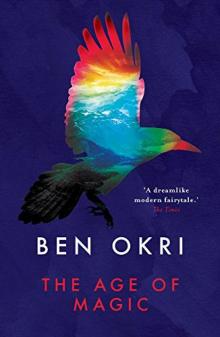 The Age of Magic
The Age of Magic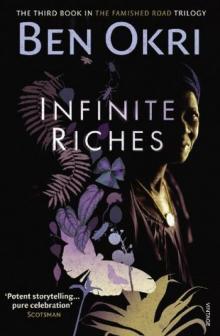 Infinite Riches
Infinite Riches Songs of Enchantment
Songs of Enchantment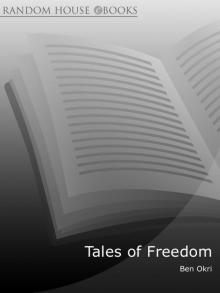 Tales of Freedom
Tales of Freedom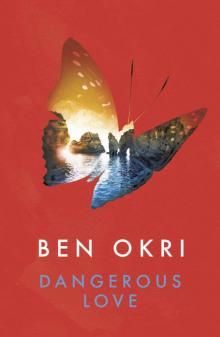 Dangerous Love
Dangerous Love Starbook
Starbook The Famished Road
The Famished Road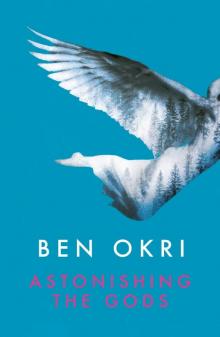 Astonishing the Gods
Astonishing the Gods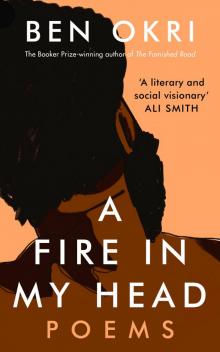 A Fire in My Head
A Fire in My Head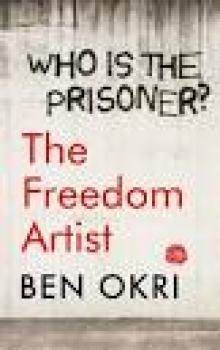 The Freedom Artist
The Freedom Artist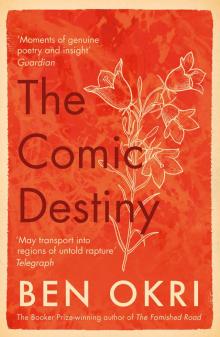 The Comic Destiny
The Comic Destiny A Way of Being Free
A Way of Being Free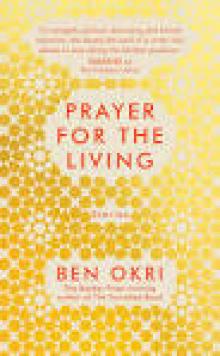 Prayer for the Living
Prayer for the Living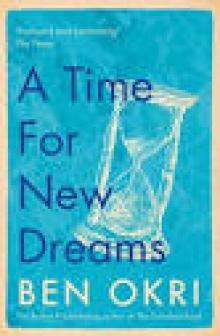 A Time for New Dreams
A Time for New Dreams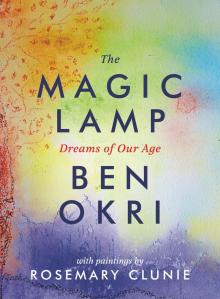 The Magic Lamp
The Magic Lamp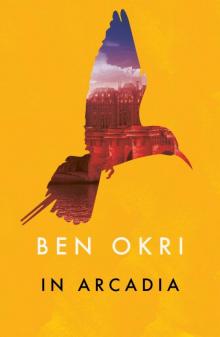 In Arcadia
In Arcadia